Understanding Why Cats Suck on Blankets and How It Helps Them Feel Good
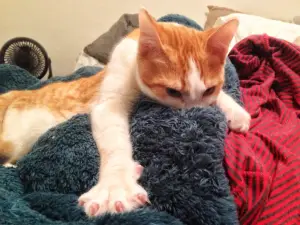
Cats sometimes do something funny: they suck on blankets! It might seem weird, but lots of cats do it, especially the little ones. It’s kind of like when babies suck on pacifiers to feel better. Cats do it when they’re stressed or worried to help themselves relax.
A cat expert named Janet Cutler says that blanket sucking is usually okay and helps cats chill out. But she says we should watch out to make sure they don’t eat the blankets, which could make them sick. If you’re worried about your cat’s blanket sucking, don’t fret! There are ways to deal with it and keep your furry friend happy and healthy.
Reasons Why Cats Suck on Blankets
1. Comfort and Security
Cats are creatures of comfort, and they often seek out soft, familiar objects for solace. Sucking on blankets may provide them with a sense of security and reassurance, especially during times of stress or uncertainty. Much like a child clutching a favorite stuffed toy, cats may turn to blankets for comfort when they’re feeling anxious or afraid.
2. Nurturing Instincts
The act of sucking is deeply ingrained in a kitten’s nature from birth. Nursing from their mother provides not only nourishment, but also comfort and warmth. Even as they grow older, cats may retain this instinctual behavior as a way to recreate the comforting sensation associated with nursing. Sucking on blankets can evoke feelings of contentment and security, akin to the warmth and safety they felt while nursing as kittens.
3. Oral Fixation
Some cats develop oral fixations, where they feel compelled to suck or chew on objects as a form of self-soothing. This behavior can stem from various factors, including weaning too early, stress, or boredom. Blankets, with their soft texture and familiar scent, may become a preferred item for cats to suck on when they’re feeling anxious or restless. It’s essential to address any underlying issues contributing to the oral fixation to prevent it from becoming a compulsive behavior.
4. Attention-Seeking Behavior
Cats are highly social animals and crave interaction and attention from their human companions. Sucking on blankets may serve as a way for cats to communicate their need for affection or companionship. If your cat feels lonely or neglected, they may resort to blanket sucking as a way to garner your attention. By responding positively to your cat’s behavior and providing plenty of love and affection, you can help fulfill their emotional needs and reduce their reliance on blanket sucking for attention.
5. Boredom or Anxiety:
Like humans, cats can experience feelings of boredom or anxiety, particularly when left alone for extended periods. In such situations, cats may engage in repetitive behaviors like blanket sucking as a way to alleviate stress or alleviate boredom. Providing your cat with ample mental and physical stimulation through interactive toys, playtime, and environmental enrichment can help redirect their focus and reduce their reliance on blanket sucking as a coping mechanism.
Knowing why your cat sucks on blankets can help you help them. You can make changes, like adding more fun stuff to their environment or giving them different things to cuddle with. If you’re still not sure what to do, you can always ask a vet or a pet behavior expert for advice. There are lots of ways to keep your cat feeling good without them needing to suck on blankets.
Should I Worry If My Cat Sucks Blankets?
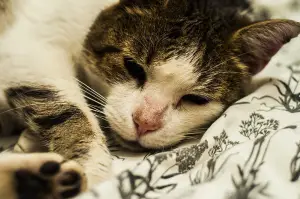
It’s totally normal for cats to suck on blankets, so don’t worry if your cat does it. Kittens often stop this behavior as they grow up, usually by the time they’re about a year old. But some cats keep doing it into adulthood because it helps them feel cozy.
However, if your grown-up cat suddenly starts sucking on blankets, it might mean something’s wrong. It could be a sign of dental problems or tummy issues causing them pain. In that case, it’s best to check with your vet to make sure everything’s okay. Keeping an eye on any changes in your cat’s behavior can help catch issues early.
How to Manage Blanket Sucking
If you’ve noticed your cat sucking on blankets, and you’re wondering how to address this behavior, you’re not alone. While blanket sucking is generally harmless, it’s understandable to want to find ways to manage it, especially if it’s becoming excessive or causing concerns. Here are a few methods you can attempt:
1. Provide Alternative Comfort Items
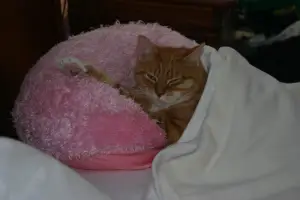
To help your cat stop sucking on household blankets, give them soft plush toys or special blankets made just for pets. These items should feel cozy and comforting, like the blankets they’re used to. Put these toys or blankets in places where your cat likes to hang out, so they’re easy to find. You can even make the toys more interesting by adding crinkly textures or hiding treats inside.
It’s also a good idea to switch up the toys or blankets regularly to keep your cat interested. Some cats might take to the new items right away, while others might need a little encouragement. You can praise your cat or give them treats when they use the new toys, so they learn that these items are just as good as blankets for comfort.
2. Regular Exercise for Your Cat
Making sure your cat gets enough exercise is super important. Daily playtime isn’t just about burning off energy—it’s also a chance for you to bond with your furry friend. Plus, keeping your cat active helps prevent health issues like obesity and keeps them mentally sharp. So, grab some toys and spend some quality time playing with your cat each day. It’s good for both of you!
3. Consultation with a Veterinarian or Behaviorist:
If blanket sucking persists despite your efforts to manage it, consider seeking guidance from a veterinarian or certified animal behaviorist. They can assess your cat’s behavior and provide personalized recommendations or behavior modification plans tailored to address the underlying causes of blanket sucking.
4. Address Underlying Stress or Anxiety:
Identify and address any underlying stressors or anxiety triggers that may be contributing to your cat’s blanket sucking behavior. This may involve creating a calm and predictable environment, providing hiding spots or elevated perches for security, or implementing relaxation techniques such as pheromone diffusers or calming supplements under the guidance of a veterinarian.
Conclusion
In summary, understanding why cats suck on blankets helps us take better care of them. It’s something they do for comfort and security, like how babies use pacifiers. It’s cute and usually harmless, but we should watch out for them eating the blankets, which could make them sick.
To help our cats, we can give them other soft things to cuddle, play with them every day to keep them happy and healthy, and ask a vet or expert for advice if needed. By doing these things, we can make sure our furry friends feel good without needing to suck on blankets.

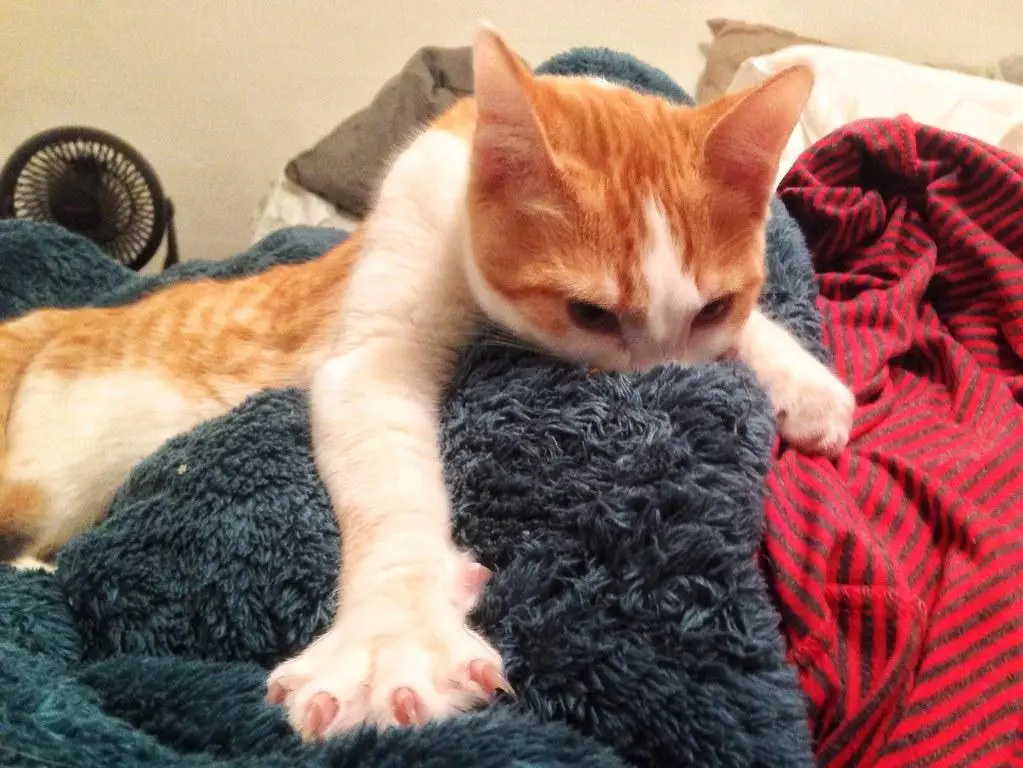
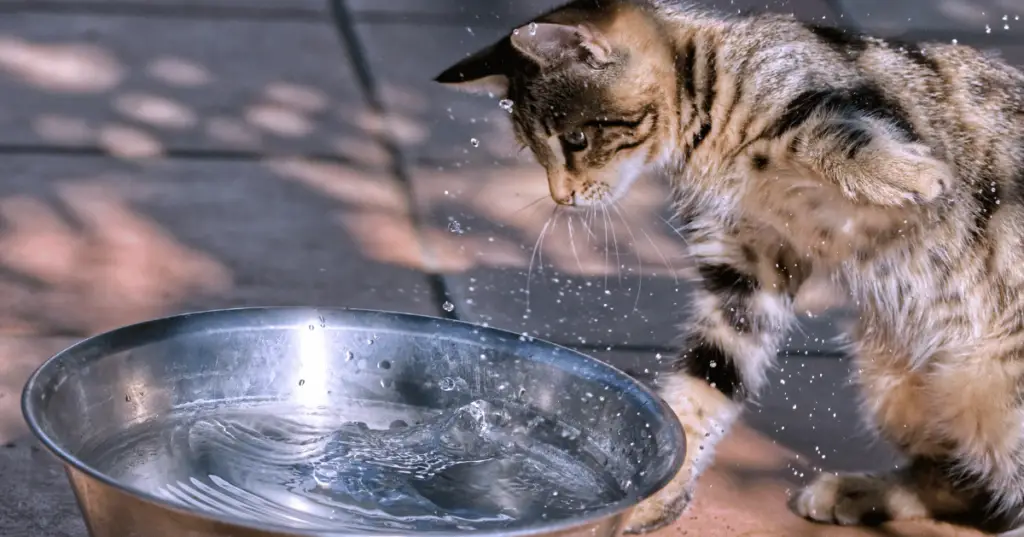
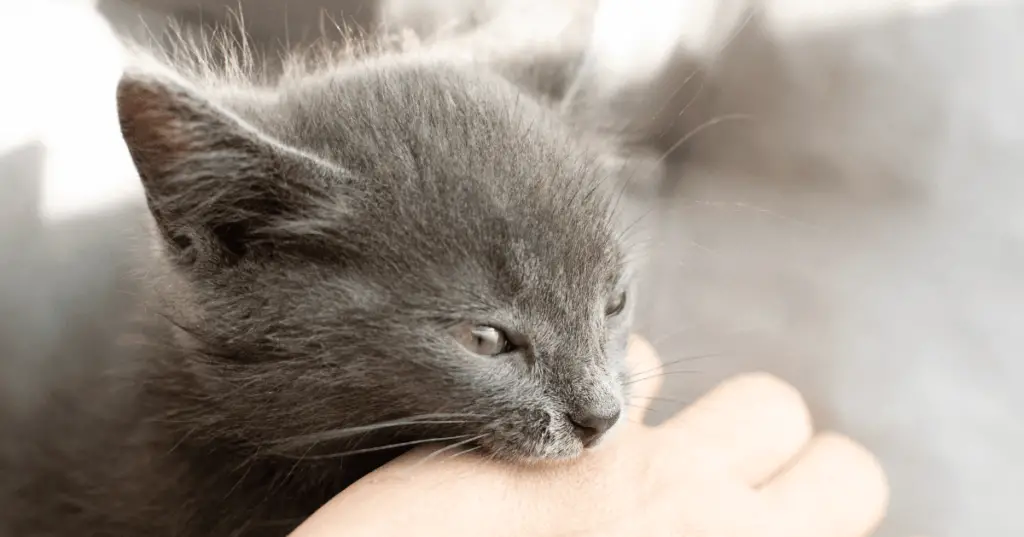
Pingback: Are Heated Blankets Safe for Cats? - catszilla